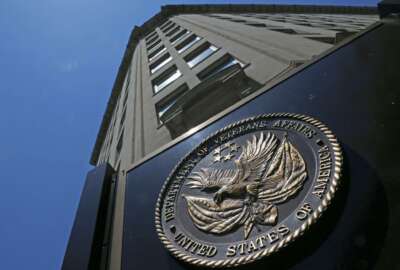
USPTO sweetening the deal for COVID-related patents
In today's Federal Newscast, inventors working anything Covid related could get special goodies from the Patent and Trademark Office.
To listen to the Federal Newscast on your phone or mobile device, subscribe in PodcastOne or Apple Podcasts. The best listening experience on desktop can be found using Chrome, Firefox or Safari.
- Inventors working anything COVID-related could get special goodies from the Patent and Trademark Office. USPTO extended its Patents for Humanity awards program to people or companies developing technologies for finding, treating, or testing for the COVID-19 virus. Award winners get a ticket to accelerated processing of a COVID matter, which they’re entitled to sell. Winning inventors can also use the certificates to help get loans or grants to commercialize what they come up with. Plus they get public recognition of the work they’re doing. PTO will announce winners in August.
- The Postal Service has a lot to lose if its 10-year plan doesn’t get off the ground. Postmaster General Louis DeJoy said in an interview the Postal Service will run out of cash late next year if the plan goes nowhere. The plan calls on legislative fixes from Congress and actions from the Postal Regulatory Commission. As for what USPS can get done on its own, DeJoy said the agency is looking to shrink its management workforce through Voluntary Early Retirements. He said the agency doesn’t have plans for a non-voluntary reduction in force, but didn’t rule it out either. (Federal News Network)
- The Biden administration is still not ready to release its “skinny” budget for fiscal 2022. White House Press Secretary Jen Psaki called the document a “discretionary guidance” and said it would be released soon, but offered nothing more specific. Psaki pointed to two reasons for the delay. One was the impact by some of the outgoing Trump administration appointees. Second, Congress denied the administration a head of the Office of Management and Budget. Both the Trump and Obama administrations put out initial budget plans by February.
- Department of Veterans Affairs staff are struggling to keep pace with a growing number of suicide prevention programs at the agency. The Government Accountability Office said staff are burning out due to the workload. VA facilities are supposed to have one mental health professional for every 10,000 veterans the hospital serves. But GAO said it’s unclear whether that model best suits the department’s actual workload. Some local suicide prevention teams said they’re losing staff members because of the stress.
- The Department of Homeland Security said vaccinations among frontline employees are up ten-fold since January. Over 58,000 DHS employees with public-facing jobs are vaccinated. That’s up from roughly 5,700 employees at the beginning of February. The Department of Veterans Affairs is providing and administering vaccines to DHS employees through an inter-agency agreement. More than 160 VA medical centers are now providing vaccines to the DHS workforce. DHS Secretary Alejandro Mayorkas said more vaccination clinics are planned for DHS employees.
- The IRS is looking to reduce its reliance on paper, increase its access to machine-readable data, and use its data to improve taxpayer experience. To get there, the agency’s Enterprise Digitalization and Case Management Office outlines procurement goals for the rest of 2021. The IRS told industry it’s looking to acquire machine-readable data from poor-quality images, high-speed scanning and artificial intelligence solutions. The agency will carry out this work through its Pilot IRS program, which awards incremental funding to emerging-tech solutions.
- Another key piece of the Air Force’s move to enterprise IT-as-a-service is in place. The much-watched enterprise IT-as-a-service initiative at the Air Force now has a centralized security operations center. Hansom Air Force Base went live with its SOC in late February. It is analyzing data from Buckley Garrison in Colorado and Offutt Air Force Base in Nebraska, which are two of the six risk reduction pilots under EITaaS. The security operations center is not replacing existing cyber defenses, but testing data-centric and commercial software tools to see how they can provide increased threat detection leading to shorter response times. The SOC also is taking advantage of visualization and automation capabilities.
- Teresa Carlson is leaving Amazon Web Services and moving to Splunk. The long-time federal contractor executive is the new chief growth officer and president, a newly created position at the data and technology company. Carlson left AWS after 10 years where she was vice president of worldwide public sector and industries. She will lead and work closely with Splunk’s sales, customer success and marketing. Her first day at Splunk is April 19th.
- COVID-19 took a toll on the quality of the military’s basic training programs. That’s according to the trainers themselves. In a survey of almost 1,300 training personnel, 87% said they were concerned that new enlistees were graduating from basic training without enough instruction on military skills and discipline. 78% had concerns about physical fitness. The Pentagon’s inspector general conducted the survey. The worries arise mostly from the fact that the military services suspended some key elements of basic training during the early part of the pandemic, including certain fitness tests and hand-to-hand combat exercises.
Copyright © 2025 Federal News Network. All rights reserved. This website is not intended for users located within the European Economic Area.
Eric White
Eric White is news anchor and Federal Drive producer at Federal News Network.
Follow @FEDERALNEWSCAST
Related Stories
Lauren Larson/Federal News Radio





